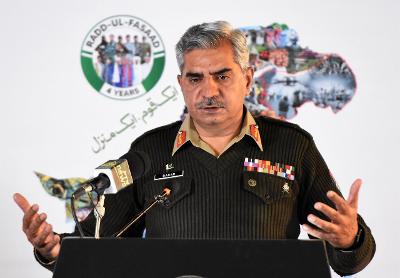Zubair Ahmad
RAWALPINDI: Director General of Inter-Services Public Relations (ISPR) Maj Gen Babar Iftikhar acknowledged that Pakistan has come a long way in getting rid of extremists but a lot of ground remains to be covered.
The military spokesperson was speaking to media on the fourth anniversary of Operation Raddul Fasaad. Maj Gen Babar Iftikhar shared details about the dividends earned through the operation that was launched on February 22, 2017 by under the leadership of COAS General Qamar Javed Bajwa.
The operation was launched to indiscriminately eliminate the “residual/latent threat of terrorism”, consolidating the gains made in other military operations, and further ensuring the security of Pakistan’s borders, according to a statement issued by the military.
He said the strategic intent of Radd-ul-Fasaad was, and is, a peaceful, stable and normalised Pakistan where people’s confidence in the state is restored and terrorists are rendered completely ineffective by curtailing their freedom of action.
“While armed forces fight terrorists, terrorism and extremism can only be defeated by civil law enforcement agencies and society as a whole. That’s how we look at it,” stressed the DG ISPR.
Speaking more about the military operation, Maj Gen Babar Iftikhar said “every Pakistani” is a soldier of the operation under the “whole of nation approach”.
He also explained the reasoning behind the operation, saying that it was launched at a time when the terrorists, after seeing the destruction of their infrastructure in tribal areas and facing heavy losses after different operations, tried to take refuge in different areas of Pakistan.
Maj Gen Iftikhar said that after the country was faced with such a situation, the operation was launched under a “two-pronged strategy”.
“One prong focused on counter terrorism and the other focused on violent extremism,” said the DG ISPR.
The head of the military’s media wing, speaking about the strategy behind Radd-ul-Fasaad, said that the counter terrorism aspect of the strategy had a few “cardinals”.
He explained that these cardinals were that “violence can only be used by the state”, making the western zone of the country stable with proper border management system and eliminating the support base of terrorists.
Speaking about the counter violent extremism strategy, the DG ISPR said: “One thing is clear that an ideology can only be countered by a superior ideology or a superior argument as we say.”
He added that within this context, the strategy behind the operations was to take part in the implementation of the National Action Plan, inclusion of tribal areas in national mainstream, and controlling extremism by taking part in the government’s reforms pertaining to police, education and madressahs.
During the briefing, the DG ISPR also gave a detailed overview of Pakistan’s grand strategy in the war against terrorism.
He said the operation’s strategy was based on four words, which were “clear, hold, build and transfer”.
“These were the four principles under which we fought this war,” said the DG ISPR.
The military spokesperson said that the clear and hold phase was being implemented from 2010-2017.
“[Under] the clear and hold phase, after major operations, different areas were cleared of terrorists and the state’s write was restored in tribal areas,” said the military’s spokesperson.
He added that operation Raad ul Fasaad was part of the “build and transfer phase”. The DG ISPR added that under this phase, the objective of the military was to make “hard-earned gains irreversible”.
While talking about the operation, Maj Gen Iftikhar disclosed that more than 375,000 IBOs were conducted in the last four years. He said that out of those, over 34,000 operations were conducted in Punjab, over 150,000 in Sindh, over 80,000 in Balochistan and more than 72,000 in Khyber Pakhtunkhwa.
“Through this, urban terrorism was controlled and many terrorists’ networks were finished,” said the DG ISPR.
The DG ISPR said that while the military had launched Operation Radd ul Fasaad, the Khyber IV Operation and Operation Dawatoi were also being carried out.
He also shared that major work is being done, as part of the operation, on deweaponisation, explosives’ control and demining of areas.
The DG IPSR also shared that under the operation, the number of checkposts in the area have also been reduced. He added that under Operation Radd-ul-Fasaad, action had been taken against 78 terrorist organisations, their assets were frozen and their movement was kept in check by the armed forces.
Maj Gen Iftikhar said that during the operation Radd ul Fasaad Pakistan countered the nefarious designs of hostile agencies. He also said that under the programme the sixth population census was done in the country.
The DG ISPR said that a measure of Operation Radd ul Fasaad’s success can be gauged by the improvement in Karachi’s ranking when it comes to the crime index, when the city was ranked at number 6 previously and had now fallen down to 106.
He also stated that the success of the operation also led to development projects in Khyber Pakhtunkhwa and Balochistan.
“The journey from terrorism to tourism was extremely difficult and painstaking. And today, [cricket] grounds are full, Gwadar, the Northern Areas and K2 are the focus of the world,” said the DG ISPR.
The military’s spokesperson said that the Pakistan Army had carried on with the operation despite the entire country facing huge challenges such as the coronavirus pandemic, the locusts attack and a polio campaign.
“Operation Radd ul Fasaad did not stop, fencing, IBOs and clearance of areas which had not been cleared previously, went on,” he said.
The DG ISPR said that for the upcoming Pakistan Day next month, a parade will be held to celebrate the nation’s Republic Day. He said that the message for the entire nation on the occasion will be “one nation, one destination”.
“We have come a long way but I must say that there is a lot of ground to be covered. This we can cover by being one and united,” he added.

















